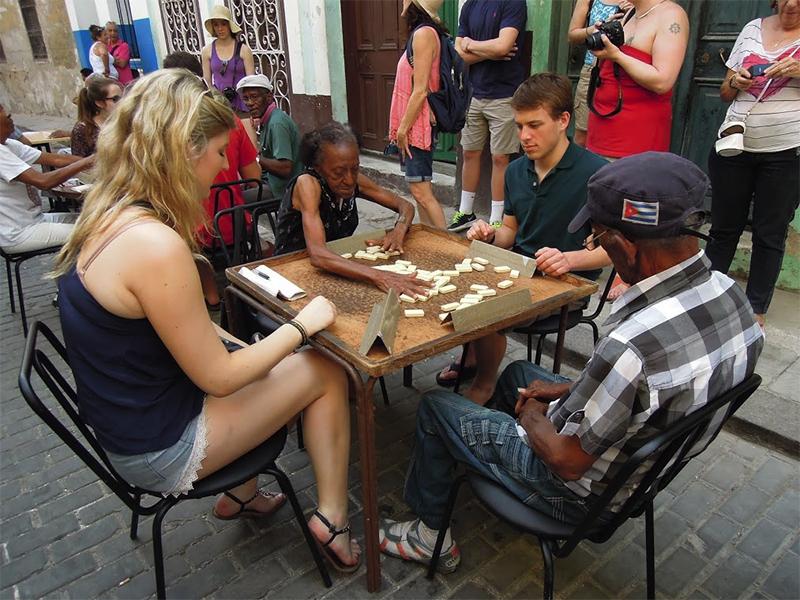Cuba: A Paradox of Poverty and Paradise
Photo by Zoe Calianos
April 28, 2014
My first indicator should have been the applause that erupted as soon as the wheels of the plane touched down.
Exiting the bright blue and burnt orange colored airport, we were greeted by a crumbling house with a crumbling sheet of metal for a roof and a crumbling fence that contained two cows grazing on wilted grass. Above the house to the right was a billboard that read, “Revolution Socialismo.”
Compared to Cape Cod, Cuba is another world.
On the first day of our tour, our tour guide Jorge told us that Havana is the original Las Vegas, in other words, “What happens in Havana, stays in Havana.” Signs for ice cream missing three or four letters, an abandoned Coney Island theme park, and the once vividly colored chips of paint that dangle off nearly every building eerily suggest Havana’s prime.
Stray dogs missing tails and stray cats missing eyes meander through the streets intertwined with Cubans who move with an equally careless gait. The men smoke cigars while they tote tools to wherever they’re working. The women, boasting both round bellies and high heels, emanate pride and femininity unparalleled by any supermodel we’ve produced in the United States. Anywhere you turn, if you look hard enough, you’re sure to find a group of men strumming and beating hodgepodge instruments and a group of women swaying their hips to the beat.
No one seems to have any intention at all of rushing anywhere. They smile and dance and laugh like time is meaningless.
It was 10 a.m. when we arrived at a mountainside café to enjoy a splash of Cuban coffee–a drink so potent that it is almost intoxicating. While sitting around tables bobbing our heads to live salsa music, I noticed Jorge with a bottle of Havana Club in his hand. With his grandfather smile and a gleam in his eyes, he danced around the room pouring the rum into eager Cubans’ sodas and coffees. Watching him, I realized that I couldn’t tell if he had just met these people or if they were all his own brothers and sisters. As the trip progressed, I realized that in Cuba, everyone is a brother or a sister.
On one of the first days, we visited a nursing home. It was domino day. Poised around rickety, chipping tables, ancient Cubans with night black skin and starry eyes, schemed and trash talked their ways through competitive rounds of dominoes. With delight, they invited us to sit down and join their games. The language barrier evaporated and we soon found ourselves laughing and clapping along with them. As we tore ourselves away from our new friends to continue our tour, a group of Asian tourists sat down and were greeted with the same enthusiasm and openness that we were. No hesitation, no judgment.
But behind the broad smiles, stretching Gulf, and blooming tropical flowers, there were the hints of communism that most Americans expect when they think of Cuba. Towering buildings with Che or Fidel’s face on them loom beside posters and signs reminding the people that the revolution must continue.
And although toilet paper and pens are scarce, Cuba has no shortage of beggars. Tourists may be charged for anything from snapping a picture of an old man smoking a cigar to listening to a performance at breakfast.
Jorge joked that a good Cuban pick-up line is, “Girl, you’re like the government; you’ve got everything.” Although many Cubans admitted to dreaming of travelling to the United States, they still acknowledged the best of communism.
A 23 year old philosophy student who was dissuaded by the government from following his passion to become an architect, told me that communism, socialism, and capitalism are all essentially just different levels of the same concept. Despite his seemingly satisfied attitude toward communism, he was brimming with questions about school in America, particularly the SAT’s, which he hopes to take one day. Talk about perspective.
But the United States and Cuba differ in so much more than just societal organization. Lunch in America is a drive-through McDonalds. Lunch in Cuba is a rooftop meal with live music followed by flan and coffee and topped off with a dance or two. Driving down the street, the houses may not have been quaint colonials with white picket fences, but every man, woman, and child was outside in their weed filled, littered yards, smiling with neighbors and absorbing the day.
After about an hour in the humid Havana air, and I was already aching to return one day. Cuba captivated me with its resilience, pride, and understated beauty. I have never, nor do I ever expect, to visit a place so stricken with poverty and yet so shockingly gorgeous.
On our last night, Jorge told us that he was not saying goodbye. “We will be waiting here for you,” my friend said with a sparkling hope in his eyes that fully and perfectly embodied everything I had come to know about Cuba.


